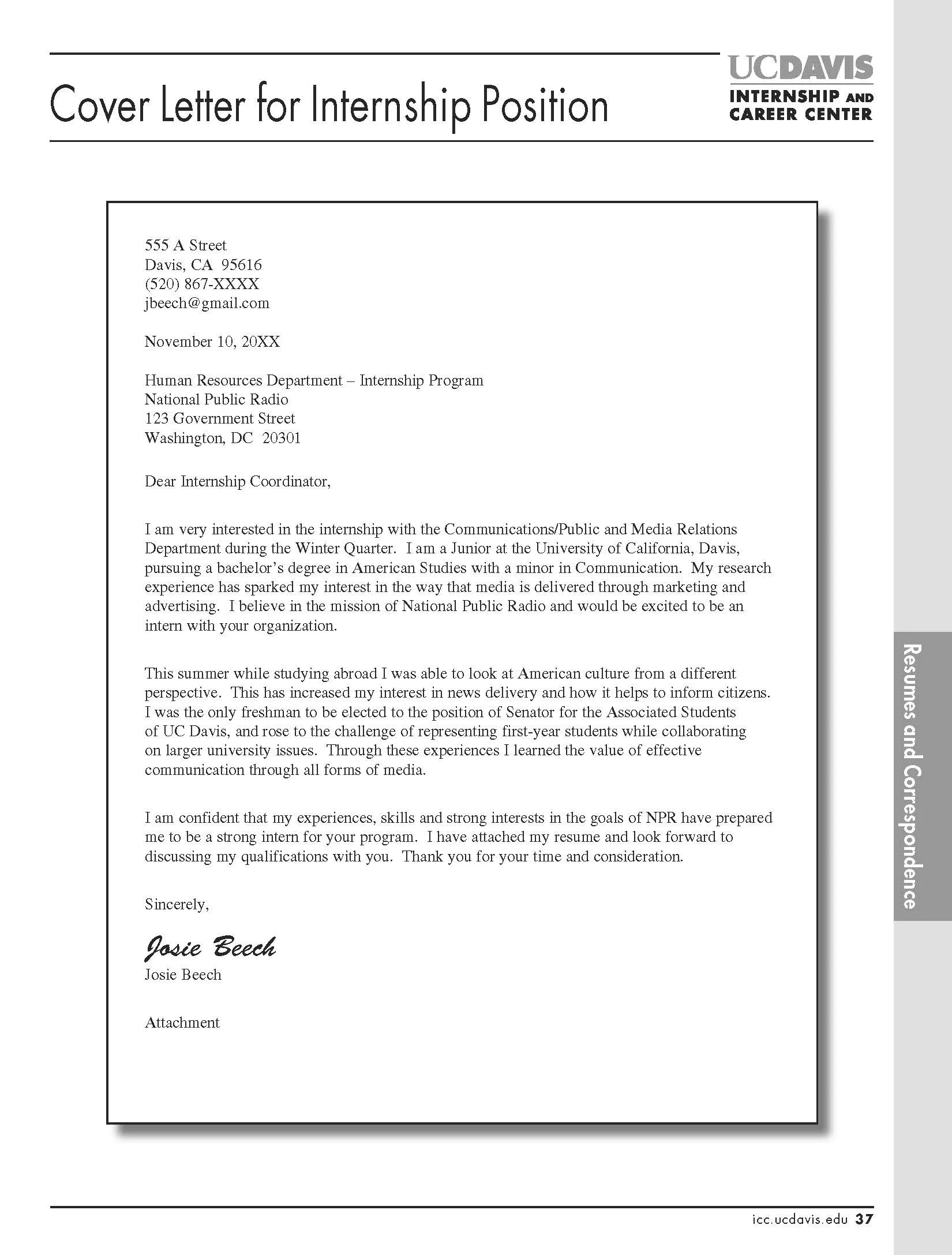Key Components of a Writing Internship Cover Letter
A well-crafted cover letter is your first impression on a potential employer, providing a vital opportunity to highlight your skills and enthusiasm for a writing internship. It’s your chance to showcase not only your writing skills but also your personality, and suitability for the role. A strong cover letter complements your resume by providing context, demonstrating your passion, and highlighting specific skills relevant to the position. Unlike a resume which is often a static summary of experience, a cover letter allows you to elaborate on experiences and achievements, making a compelling case for why you are the perfect fit for the internship. This guide will break down the key components needed to create a persuasive cover letter, giving you the best chance to secure that coveted internship.
Your Contact Information
At the very top of your cover letter, present your contact information. This should include your full name, phone number, email address, and optionally, your LinkedIn profile URL. Ensure that your email address is professional and suitable for a job application; avoid using nicknames or informal addresses. Presenting this information clearly and concisely makes it easy for the hiring manager to reach out to you. Double-check the details for accuracy; a single typo can prevent a potential employer from contacting you. Using a consistent font and format that matches your resume creates a cohesive professional look. Always ensure your contact information is up-to-date, and your voicemail is set up if you provide a phone number. This section ensures the employer can quickly contact you.
The Date
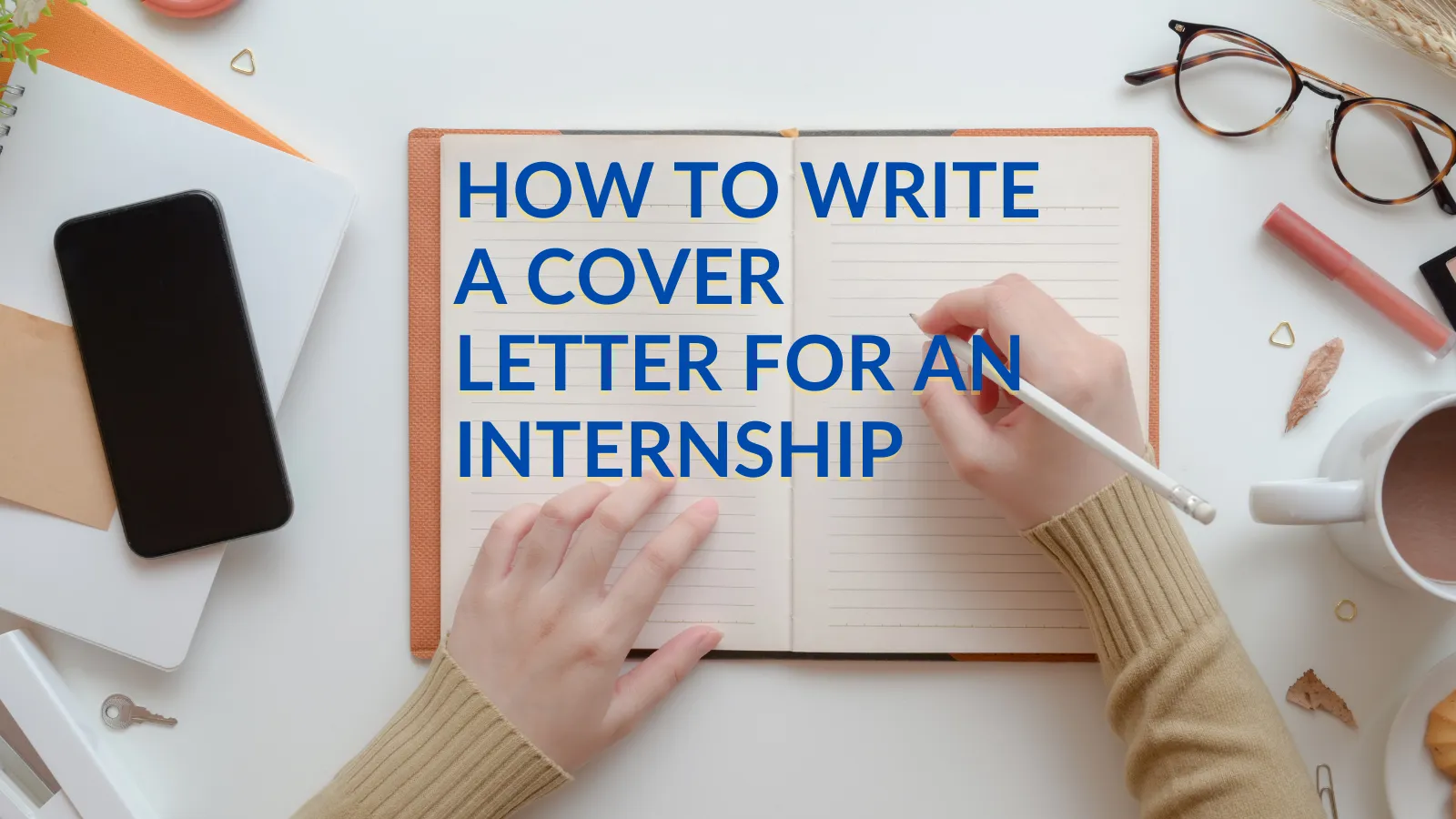
Following your contact information, include the date you are sending the cover letter. This simple step helps the employer understand when you applied and can assist in record-keeping, especially if they’re considering multiple applicants. The date should be formatted consistently throughout the document, such as Month, Day, Year, e.g., July 20, 2024. Correctly dating the letter demonstrates attention to detail, a critical skill for any writer. This also provides context if the application is being reviewed at a later date. Ensure the date is current and accurately reflects when you are submitting the letter. Place the date directly below your contact information, usually aligned to the left or right, depending on your chosen format. Consistency in formatting demonstrates professionalism.
Employer Contact Information
Next, include the employer’s contact information. This typically includes the hiring manager’s name (if known), their title, the company’s name, and the company’s address. If you cannot find the hiring manager’s name, thorough research on LinkedIn or the company website is essential to identify the appropriate person to address the letter to. Addressing the letter to a specific person demonstrates initiative and a desire to connect directly with the company. If the name is unavailable, you can use a general title like ‘Hiring Manager’. Always double-check the spelling of names and the accuracy of the company information; this demonstrates respect and professionalism, and can significantly impact the reader’s perception of your attention to detail. Position this section just below the date, ensuring a clear and logical structure.
Crafting a Compelling Opening
The opening paragraph is the most crucial aspect of your cover letter, as it is the first impression you make. It should immediately capture the reader’s attention and compel them to continue reading. Start with a strong hook that reflects your enthusiasm for the position and the company, which can be achieved by referencing something specific about their recent work or values. Mention the specific writing internship position you are applying for, along with where you found the opportunity, such as a job board or company website. Briefly state why you are a great fit, emphasizing your relevant skills or experiences that align with the role’s responsibilities. Avoid generic opening lines; instead, tailor the introduction to the specific internship and the company’s values to demonstrate you’ve done your research. The aim is to make the reader want to learn more about you and consider you as a candidate.
Highlighting Your Passion
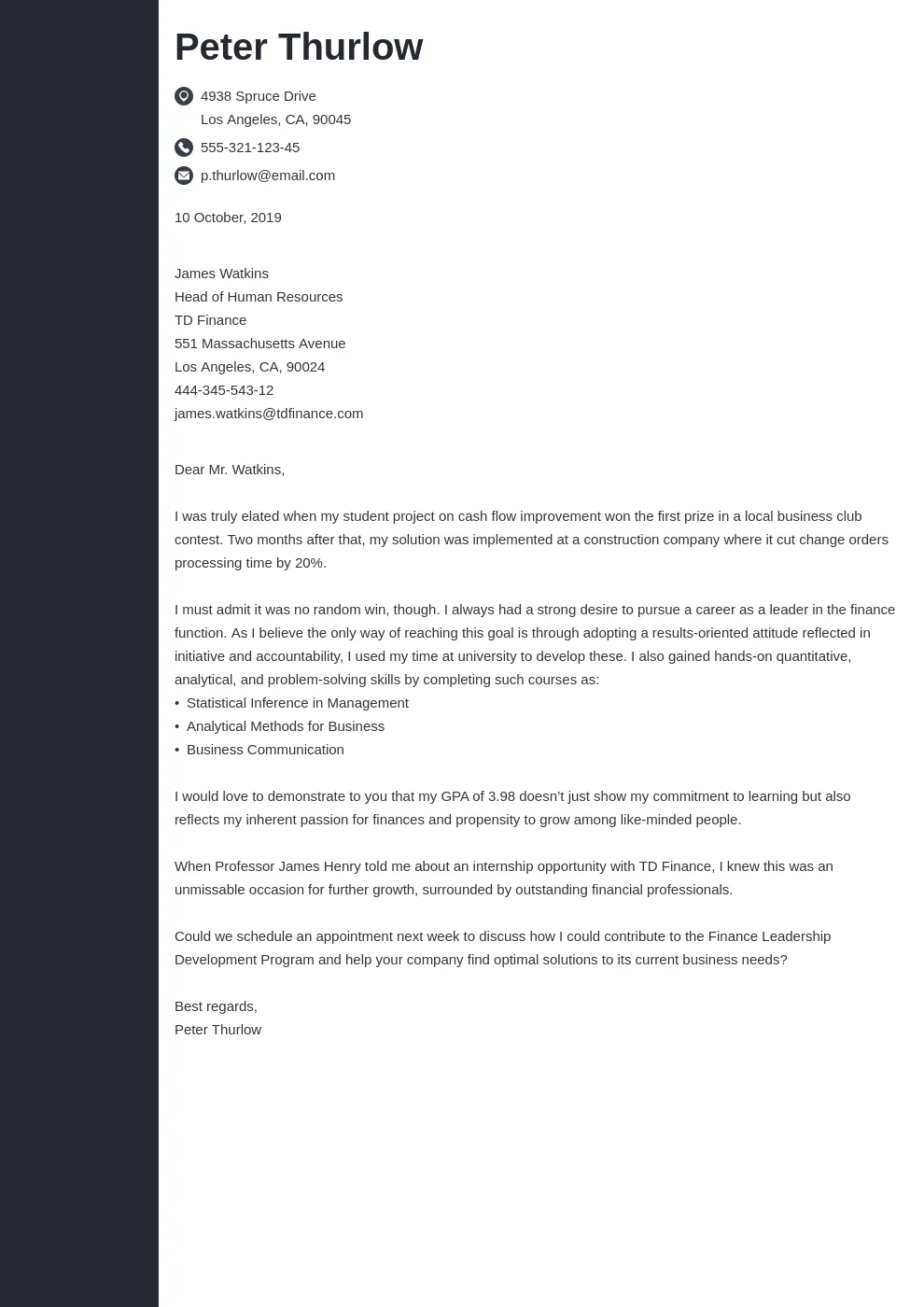
Demonstrate your passion for writing and the specific industry or field the company is in. Share what specifically excites you about the internship and how it aligns with your career goals. Show that you have a genuine interest in the work and the organization’s mission. Mention any personal experiences or projects that demonstrate your commitment to writing. This could include freelance work, blog posts, or any other relevant activities that showcase your abilities. Sharing your enthusiasm can make your application more memorable and show that you are not just seeking a job, but are genuinely interested in the opportunity and the company. Make sure the passion aligns with the company’s values, showing you’ve done your homework. Always keep the tone professional, even when expressing personal enthusiasm.
Referencing the Internship
Clearly state the specific writing internship you are applying for and how you found it (e.g., on a job board, through a referral, or on their website). This gives the hiring manager immediate context and ensures they know which position you are interested in. If the internship has a specific title, use it exactly as listed in the job description; this indicates you have carefully read the job posting and pay attention to detail. If the internship posting mentions specific skills or qualifications, make sure to directly address those points in your cover letter, highlighting relevant experience that meets their criteria. Provide a brief overview of your understanding of the role’s responsibilities, showcasing how your skills align. Referencing the internship correctly shows that you pay attention to detail and are serious about the application, demonstrating your commitment to the role. Make sure that the title, location, and details of the chosen application match what is advertised in the job description.
Showcasing Your Skills and Experience
The body of your cover letter is where you showcase your relevant skills and experience. Highlight your writing abilities, such as your ability to write clear, concise, and engaging content. Mention any specific types of writing you have experience with, such as creative writing, technical writing, journalism, or content creation. Provide specific examples of your writing skills through brief descriptions of projects you’ve worked on. Tailor your examples to the requirements of the writing internship, if the job description asks for particular skill sets. Use action verbs to describe your accomplishments; for example, instead of saying ‘I wrote articles,’ say ‘I researched, wrote, and edited articles for a blog, resulting in a 15% increase in readership.’ Show how your skills and experience align with the company’s needs and values. Back up your claims with concrete examples and quantifiable achievements whenever possible, ensuring your claims are verifiable. Focus on the skills specifically listed in the job description to demonstrate your qualifications.
Relevant Writing Samples

Include a brief mention of writing samples or a link to your online portfolio. If you are attaching writing samples, briefly describe the projects and how they demonstrate your skills and your writing capabilities. These samples might include blog posts, articles, website content, or any other relevant work you’ve produced. Make sure the samples are high-quality and demonstrate your best work, as these will be critical to demonstrating your abilities. Tailor the samples to the requirements of the internship, if possible, by focusing on pieces that demonstrate the skills they seek. Always proofread your samples carefully to avoid any errors that could negatively impact your application and your perception. Your writing samples are a direct representation of your skills; make sure they are impressive and representative of your best work. Providing easy access to your work makes it easier for the hiring manager to evaluate your writing skills.
Quantifiable Achievements
Whenever possible, quantify your achievements to demonstrate the impact of your work. Use numbers and statistics to show the results of your writing efforts, which gives concrete evidence of your skills. For example, if you increased website traffic through your writing, mention the percentage increase, such as ‘increased website traffic by 20%’. If you wrote content that generated leads, share the number of leads generated. If you edited a certain number of articles, provide that figure. Quantifiable achievements make your accomplishments more tangible and impressive, demonstrating to the hiring manager that you can deliver results and have a positive impact. Even small accomplishments can be quantified, such as a positive increase in website traffic. For example, if you improved a process, mention the percentage reduction in time taken for a certain task. Focus on the results that are most relevant to the writing internship. Quantifying your achievements sets you apart from other applicants and shows a data-driven approach.
Tailoring to the Specific Internship
A generic cover letter will not make a strong impression. Customize your cover letter for each writing internship you apply for. Research the company and the specific role, then tailor your letter to match their requirements, skills required, and the company values. Highlight the skills and experiences that align directly with the internship’s needs, using the job description as your guide. Use keywords from the job description in your cover letter, ensuring the hiring manager immediately sees that you are a good fit for the role. Research the company’s mission, values, and recent projects, then show how your skills and interests align with their organizational goals. Personalizing the letter demonstrates your genuine interest in the internship and the company itself. Tailoring your cover letter shows that you are willing to go the extra mile to highlight your relevant skills. Customize each cover letter to maximize your chances of success, and ensure the details are all correct.
Researching the Company
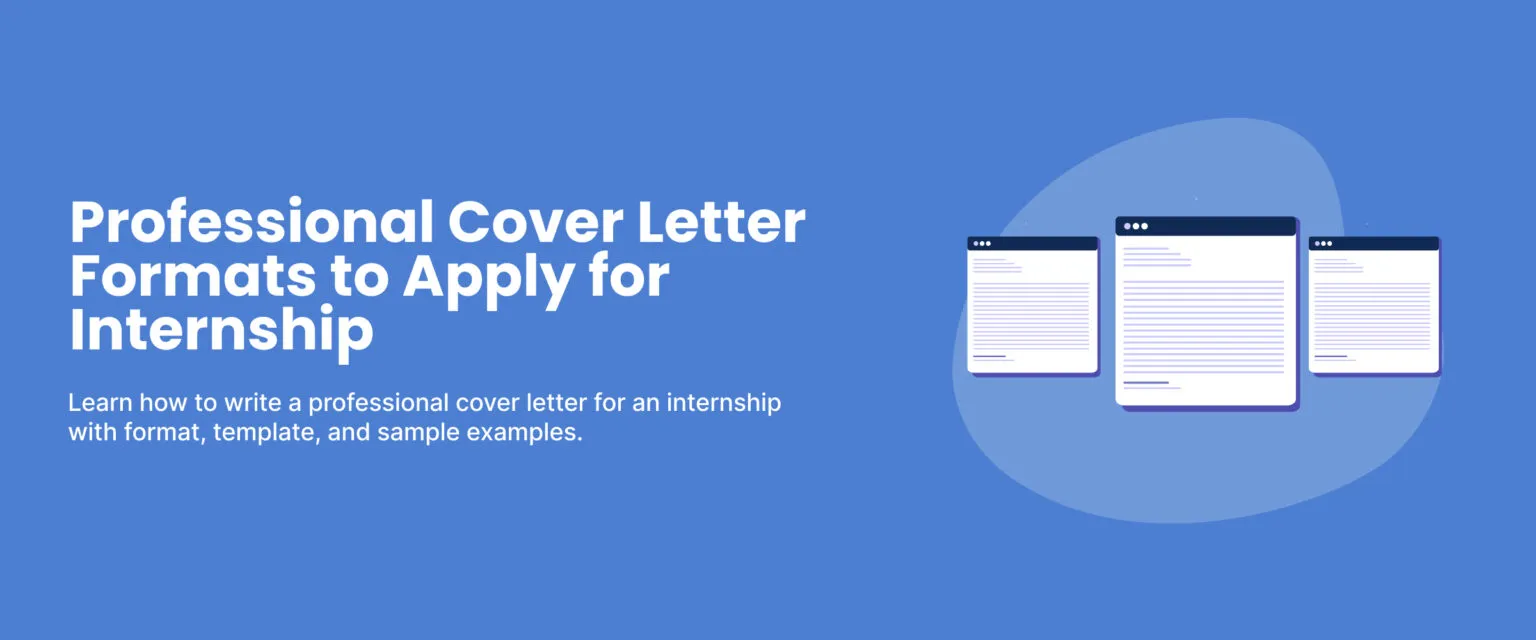
Before writing your cover letter, thorough research of the company is essential. Visit their website, read their blog, and check their social media profiles. Understand their mission, values, and the type of content they produce, which will provide you with the context to create a strong letter. This research will help you tailor your cover letter to their specific needs and demonstrate your genuine interest in the company. Pay attention to the company culture and the tone of their communications, using this information to adapt your writing style and make your letter more relevant. Understand the industry and the company’s place within it, which demonstrates that you are proactive and have a strong interest in the role. Research also shows that you are serious about the opportunity and willing to invest the time to understand their needs. Highlight areas of interest and how your skills and experience will contribute to their success. Research gives you an advantage, as it allows you to speak directly to the employer’s values and needs.
Matching Skills to Requirements
Carefully review the job description and identify the skills and qualifications the employer is seeking. Match your skills and experiences to these requirements, highlighting the relevant skills in your cover letter. Provide specific examples of how you have used those skills in the past, showing your aptitude for the role. If the job description requires specific writing skills, such as SEO writing, content marketing, or social media content creation, make sure to mention your experience and expertise in those areas, demonstrating your capabilities. Use the same keywords and phrases from the job description in your cover letter, ensuring the hiring manager quickly sees that you have the required skills. Tailoring your skills and experience shows that you are a good fit for the position and increases your chances of getting hired. Always be honest and accurate in your claims; provide examples of how you’ve used those skills. Prioritize the most important skills and experiences required for the internship, ensuring you address the main needs.
Concluding Your Cover Letter
Your conclusion should summarize your interest in the internship and thank the hiring manager for their time and consideration. Reiterate your enthusiasm for the opportunity and your eagerness to contribute to the company. Briefly restate why you are a good fit for the role, highlighting your skills and qualifications. Include a call to action that encourages the hiring manager to contact you; this makes it easy for them to take the next step in the hiring process, such as scheduling an interview. Your conclusion should leave a positive and lasting impression, reinforcing your qualifications and your interest in the role, and motivating the hiring manager to contact you. Your conclusion is the final impression you make, so it is essential to make it a good one.
Expressing Gratitude
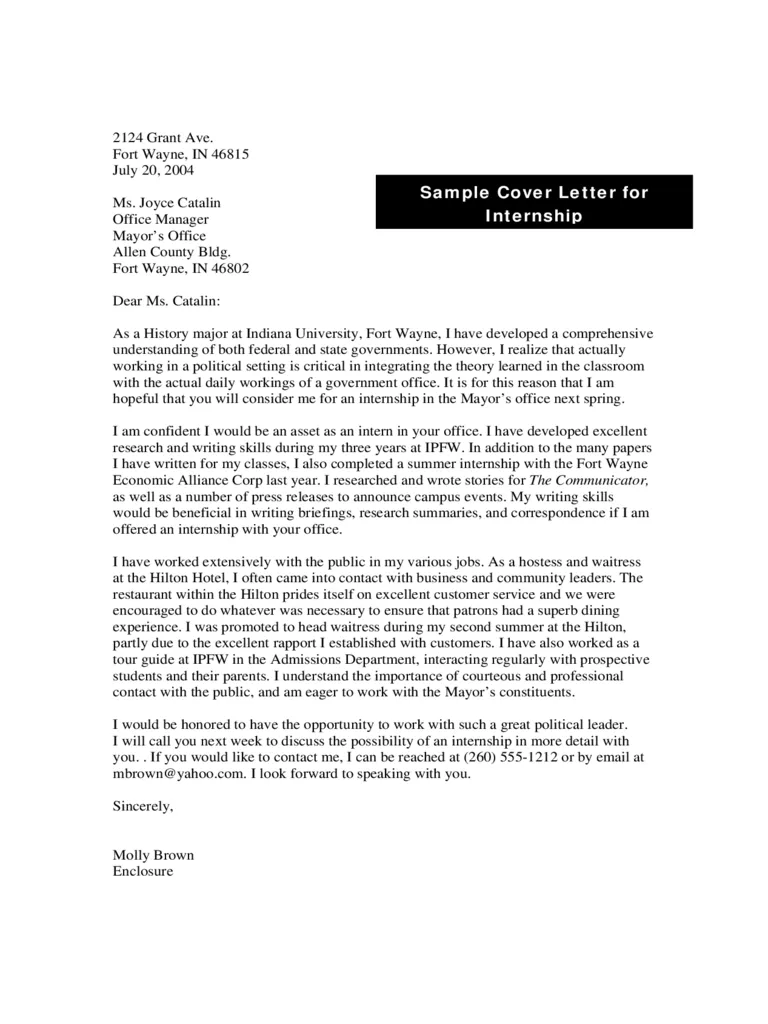
Express gratitude to the hiring manager for considering your application. Thank them for their time and effort in reviewing your cover letter and resume, which shows respect and professionalism, demonstrating your good manners. A simple ‘Thank you for your time and consideration’ is often sufficient. If you know the hiring manager’s name, address them directly by name. If not, a general ‘Thank you’ is appropriate and still respectful. Expressing gratitude leaves a positive impression and shows that you value the opportunity and appreciate their effort. Ensure that your gratitude is sincere and genuine, reflecting a true appreciation for their time. Thanking the hiring manager is a polite and professional way to conclude your letter and ensure a good closing.
Call to Action
Include a call to action (CTA) that encourages the hiring manager to contact you for the next steps. Provide your contact information again, making it easy for them to reach you, with your email address and phone number. Encourage them to contact you to schedule an interview or discuss the position further. State your availability for an interview or follow-up conversation, showing your eagerness to take the next step. Make sure to be enthusiastic about the prospect of discussing your application in more detail, which can make you appear more engaged. A strong CTA can increase your chances of getting contacted, as it directs the hiring manager to take action. Make it easy for the hiring manager to take the next step and contact you, offering them clear next steps. Examples include, “I am available for an interview at your earliest convenience,” or “I look forward to hearing from you soon, and can be reached via email or phone.”
